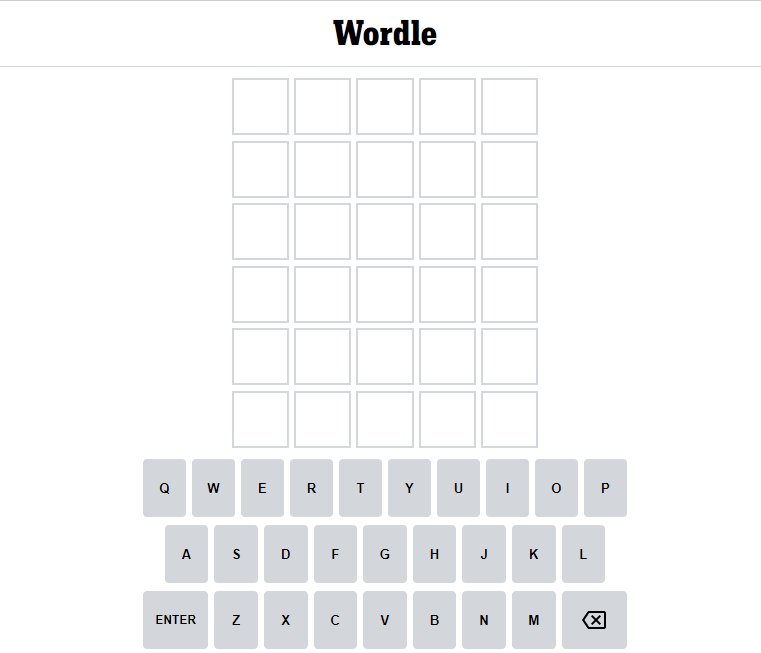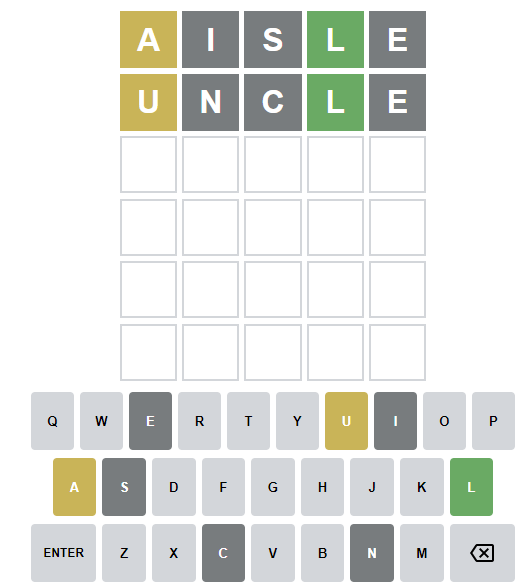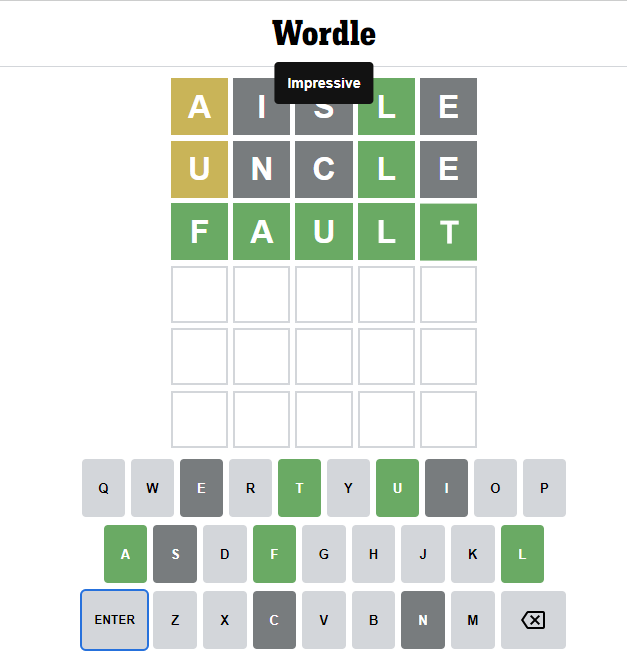NYTimes Wordle is a popular word-guessing game that has taken the internet by storm. Created by Jonathan Feinberg, the Wordle NYT game is available on the New York Times website.
NYTimes Wordle challenges players to guess a hidden five-letter word within six guesses. Each guess provides feedback on the letters that are correct and in the correct position or correct but in the wrong position. Wordle can be played for free online at the official website and can be accessed on any device with internet access and a web browser.
While the game is meant to be played without the use of a dictionary or cheat sheet, players can compete with friends or family members by comparing their scores or trying the same puzzle simultaneously. Wordle has become a favorite pastime for many, providing a fun and challenging way to test vocabulary and pattern recognition skills.
What is Wordle NYT?
Wordle is a straightforward online word-guessing game in which players must identify a keyword based on color suggestions. A new five-letter word is added to the game every day, giving you six attempts to guess it. Every player on the planet is supposed to figure out the same hidden word.
As was already mentioned, Josh Wardle invented the WORDLE NYT since he knew his partner enjoyed guessing games and wanted to build their own.
After spending some time with it, the couple decided to share the game with their family’s Whatsapp group. Once everyone became completely fixated on it, it didn’t take Josh long to realize that he should make the game available to everyone.

Screenshot
According to a New York Times report, 90 players participated in the game on November 1. Just two months later, on January 1, more than 300,000 people had used WORDLE NYT.
How To Play Wordle
Begin by typing your first five-letter word into the Wordle webpage. You can use the clickable keyboard underneath the grid or type the word into the box provided. Every answer offered must be a valid five-letter word. Press the enter key to submit.
In Wordle, you get six chances each day to identify the secret word. The color of your word’s tiles will change after each guess to indicate how close you came to getting it right.

Screenshot
The green means that you’ve picked the correct letters and are in their proper spot, while the yellow indicates your letter appears in the word but is placed incorrectly. A letter will turn gray if it does not appear in the word at any point.
In this game, you have the opportunity to share your answer and examine the day’s statistics once you have correctly identified the word or run out of attempts.
There is no need for a Wordle app. You just need to use a web browser to play on the New York Times Games website or wordle-nyt.org.
Tips To Play Wordle NYT Game
You only have six chances to choose the proper word, so keep that in mind. Below, we will provide you with a few useful tips and methods that can enhance your gaming experience.
Choose Wise First Guess
The hardest but most important stage is choosing your first word; choosing a random word is not a smart idea. Some claim that starting with vowels (AEIOU) will make it easier to find the proper words quickly.
In contrast, some contend that employing generic consonants will speed up finding the appropriate words. Other people play the game by casually typing whatever words come to mind.
If your first try is a word with the most used vowels and add those generic consonants to it, you’re far more likely to receive correct letters.
Examples that meet this condition include “ATONE,” “ARISE,” “RAISE,” “OCEAN”, and “CANOE.” Each word comes with at least 3 vowels, as you can see. Typing words with 2 or 3 of these vowels at the first try is a wise move.

Screenshot
Hunting For Upcoming Hunches
If you have green tiles and a few yellow tiles from your first guess, you have a good chance of locating the word of the day. Concentrate on searching for information while using the cues from your starting word to make a well-informed second or third guess, etc.
For instance, you might wish to place a yellow tile with a vowel next to your green letters if it is a consonant for your subsequent estimation. Most users don’t worry about predicting the word within the first handful of tries.
Use a Method of Exclusion
Wordle is best solved by starting with the more typical consonants first. Use words with S, T, R, N, or other well-known non-vowels. It makes the challenge a little bit simpler to solve if you use a variety of letters in your few guesses.
Watch Out For Repeat Letters
Supposing you’re having trouble, your puzzle may contain two instances of the same letter. These can be challenging to find, especially if you’re unfamiliar with the game. Even when you identify one occurrence, the game won’t tell you whether it also appears in other locations.
The repeated letter may appear twice in succession, as in words “truss”, “sheep”, “spell”, and “abbey”, or it may appear non-consecutively, like in words “banal” and “gorge”. We recommend using this technique on your fourth or fifth try.
Consider Bigrams
A bigram is two letters combined, and some letter combinations are more frequent together than others. The most frequent letter combinations, according to the study, are “he,” “th,” “in,” “nt” and “en.” Try one of these if you’re having trouble deciding between too many options.
Steer Clear Of Using Omitted Gray Letters
One of the most challenging things to keep in mind and adhere to when solving a Wordle is this. If a letter turns gray, don’t guess with that letter again. Doing so simply wastes one turn.
Enjoy Yourself
This is the crucial one. The objective of the game is to provide quick, silly entertainment. It doesn’t matter if your WhatsApp group is modestly gloating on their fourth straight 2/6.
FAQs
Can I play the NYT Wordle on my phone?
Yes, the diversion can be played on any gadget with an online association.
Is the NYT Wordle free to play?
Yes, the amusement is totally free to play.
Are there any prizes for speculating the secret word?
No, there are no prizes for guessing the puzzle word within the NYT Wordle. The diversion is simply for fun and excitement purposes. In any case, numerous players discover the fulfillment of speculating the word in as few surmises as conceivable to be fulfilling sufficient.
Can I play the NYT Wordle more than once per day?
Yes, you’ll be able play the amusement as numerous times as you need in a day.
Is there a restrain to how numerous rounds I can play in a single diversion?
Yes, each diversion comprises of six rounds.
Is the riddle word the same for each player?
No, the riddle word changes for each amusement and for each player.
Can I play the NYT Wordle offline?
No, the diversion requires an online association to play.
Is there a way to track my advance within the diversion?
Yes, the amusement keeps track of your best score (the number of guesses it took you to figure the word) and displays it at the conclusion of each diversion.
What is Wordle?
Wordle could be a word-guessing amusement where players have to be figure a secret five-letter word by contributing distinctive words and getting feedback on which letters are rectify and within the adjust positions.
How do I play Wordle?
To play Wordle, players must guess a five-letter word by contributing distinctive words and accepting input on which letters are correct and within the redress positions. The diversion closes when the player surmises the puzzle word accurately.
Is there a time restrain for playing Wordle?
No, there’s no time constrain for playing Wordle. Players can take as much time as they ought to figure the secret word.
Is there a restrain to how numerous surmises I can make in Wordle?
No, there’s no constrain to how numerous surmises you’ll make in Wordle. You’ll be able keep speculating until you either figure the secret word accurately or select to conclusion the diversion.
Is there a score or positioning framework in Wordle?
No, Wordle isn’t scored or positioned in any way. The amusement is basically a fun word-guessing amusement that can be played for excitement purposes.
